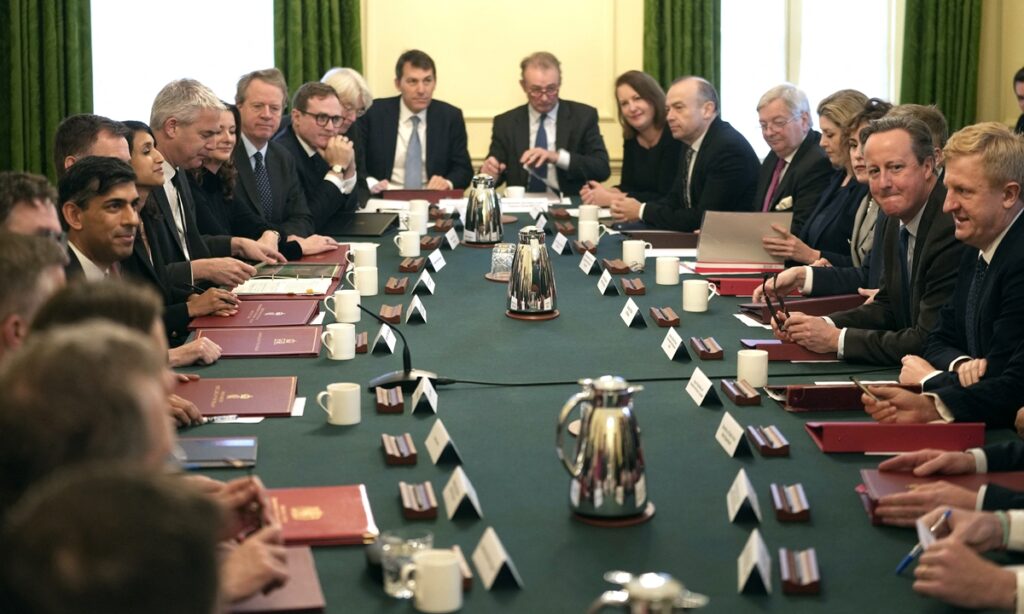After UK Foreign Secretary David Cameron said “things have changed” since he heralded a “golden era” of relations between Britain and China during his time as prime minister in an interview with British media outlets on Saturday, experts warned on Sunday that Cameron’s remarks reflect that at present, the atmosphere of public opinion toward China in the UK is so extreme that it has hijacked the politics, making it difficult for the Sunak administration to truly develop China-UK relations.
In an interview with The Telegraph, the former British prime minister identified China’s increasing “aggression” as one of the key security challenges facing the UK.
In 2015, during his tenure as prime minister, when Cameron hosted a visit to the UK by Chinese President Xi Jinping, he declared: “This visit marks the start of a new era. Some have called it a golden era in relations between Britain and China.”
Asked last week whether he believed that era had now ended, Cameron said, “I think things have changed. There’s still a need to engage with China, particularly over issues like climate change – we can’t solve problems of climate change while ignoring a fifth of humanity.
Experts pointed out that Cameron’s remarks could be interpreted as that he intended to clarify his attitude in response to doubts in the UK after he took office as the foreign minister, and is a reflection of UK’s extreme domestic hostile atmosphere against China.
Of course the development of China-UK ties is not decided by Cameron’s view alone. The China-UK relationship and the UK’s policy toward China are partly decided by internal political forces within the UK’s Conservative Party, Gao Jian, an expert on European studies at Shanghai International Studies University, told the Global Times on Sunday. “Some influential figures within the Conservative Party and Parliament strongly oppose a pro-China policy, making it difficult for the Sunak administration to fully engage in developing China-British relations,” Gao noted.
Additionally, the UK’s policy toward China is significantly influenced by threats and penetration from the US, he said. The UK’s previous role as a bridge between Europe and the US ended when it left the European Union, but the UK still needs to ensure its own survival. Therefore, based on real interests and the basic social situation, politicians from the Conservative Party believe that it is the right choice to lean toward the US at this juncture, Gao said.
Cameron, who replaced James Cleverly as UK’s foreign secretary in November, has broken from the British government’s past reluctance to publicly condemn the detention of infamous Hong Kong media tycoon Jimmy Lai, who is considered a “modern-day traitor” for his acts and deeds in instigating violent riots in Hong Kong back in 2019.
On the case of Lai, Cameron said in a statement that “I’ve come in as foreign secretary, I’ve looked at this issue, and it seems to me right that we both call out the fact that the national security law is against the joint arrangements that were put in place, and that Jimmy Lai should be freed.”
Cui Hongjian, professor of Academy of Regional and Global Governance at Beijing Foreign Studies University, told the Global Times on Sunday that Cameron’s public statement is more of his personal stance for personal political interest.
The UK government’s stance on the Hong Kong question has not changed, but they are not in a position to speak on the matter, experts said. Furthermore, the UK’s limited power determines that it does not have the ability to challenge China’s fundamental interests.
As a declining political force, the UK’s continued expression on the Hong Kong question is merely to satisfy the vanity of them as the old colonialists. Gao said.




